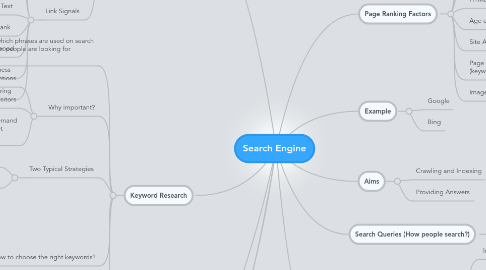
1. Components
1.1. Spiders
1.2. Indexer
1.3. Query Processor
2. How do Search Engines determine IMPORTANT
2.1. Popularity
2.1.1. the more valuable information contain
3. Why SEO?
3.1. Achieve top ranking
3.2. Increase web traffic
3.3. Increase revenue
4. Keyword Research
4.1. Identifying which phrases are used on search engines when people are looking for information.
4.2. Why important?
4.2.1. Understand visitors’ intentions
4.2.2. Enable you to reach the right visitors
4.2.3. Enable you to predict shift in demand and respond to changing market conditions
4.3. Two Typical Strategies
4.3.1. Optimizing for Traffic
4.3.2. Optimizing for Conversion
4.4. How to choose the right keywords?
4.4.1. 1.Heavily searched by visitors (Popularity) 2.Closely related to your conversion goals (Relevance) 3.Reasonable targeted by competitors (Competition) 4.Match keywords and landing pages content
4.4.1.1. For webstore
4.4.1.1.1. Use terms like buy, prices, compare in the keyword phrase.
4.4.2. Understand Visitors' intents
4.4.2.1. Transactional Searches.
4.4.2.2. Navigational Searches
4.4.2.3. Informational Searches
4.5. Aim
4.5.1. To satisfy searchers and give them a positive experience through engaged activity on your site
5. Link Building
5.1. "Natural" Editorial Links
5.1.1. Links that are given naturally by sites and pages that want to link to your content or company.
5.2. Manual "Outreach" Link Building
5.2.1. The SEO creates these links by emailing bloggers for links, submitting sites to directories,
5.3. Self-Created, Non-Editorial
5.3.1. Create links through guest book signings, forum signatures, blog comments, or user profiles.
5.4. 5 Link Building Strategies
5.4.1. Get your customers to link to you
5.4.2. Build a company blog. Make it a valuable, informative and entertaining resource.
5.4.3. Create content that inspires viral sharing and natural linking
5.4.4. Be newsworthy.
5.4.5. Find directories or listings of relevant resources.
5.5. Link Signals
5.5.1. Global Popularity
5.5.1.1. The more popular and important a site is, the more links from that site matter.
5.5.2. Local/Topic-Specific Popularity
5.5.2.1. Must be specific in keywords.links from sites within a topic-specific community matter more than links from general or off-topic sites.
5.5.3. Anchor Text
5.5.4. TrustRank
5.5.5. Link Neighborhood
5.5.6. Freshness
5.5.7. Social Sharing
6. Example
6.1. Google
6.2. Bing
7. Aims
7.1. Crawling and Indexing
7.2. Providing Answers
8. Search Queries (How people search?)
8.1. Do "Action queries "
8.2. Know "Informational Queries"
8.3. Go" Navigation Queries"
9. Search Engines' Ranking Algorithms
9.1. Indexable content
9.2. Crawlable link structures
9.2.1. Make sure the spiders can reach your page on the first place
9.3. Keyword usage
9.3.1. Use keywords in the title tag at least once
9.3.2. At least once in the alt attribute of an image on the page
9.3.3. At least 2-3 times, including variations, in the body copy on the page
9.4. Correct title tags
9.4.1. Place important keywords close to the front
9.4.2. Leverage branding
9.4.3. Consider readability and emotional impact
9.4.4. Be mindful of length
10. Page Ranking Factors
10.1. Keyword Density
10.2. Inbound links (quality & quantity)
10.3. Inbound links anchor text
10.4. HTML Page Title
10.5. Age of Domain name
10.6. Site Authority
10.7. Page URL & Meta Tags (keywords, description)
10.8. Image ALT tags
10.8.1. Relevant description of image
